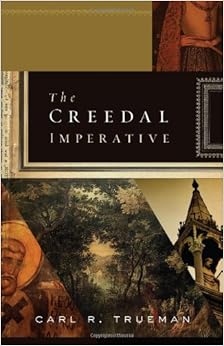 Perhaps you’ve heard or even yourself said, “I have no creed but the Bible.” This phrase used to promote biblical fidelity is also commonly deployed as a missile against creeds, confessions, and other historic, man-made documents such as catechisms. But is this dichotomy helpful? Is it even biblical? Are historic documents and biblical fidelity mutually exclusive?
Perhaps you’ve heard or even yourself said, “I have no creed but the Bible.” This phrase used to promote biblical fidelity is also commonly deployed as a missile against creeds, confessions, and other historic, man-made documents such as catechisms. But is this dichotomy helpful? Is it even biblical? Are historic documents and biblical fidelity mutually exclusive?
Carl Trueman wrote The Creedal Imperative to address this question and its apparent tension in some people’s minds. His short answer is: no. The dichotomy is not helpful. It is not biblical. The documents and the Bible are not mutually exclusive. In fact, says Trueman, these documents are very helpful and important.
Trueman investigates the suspicion people have of these documents and lends a possible solution that people are more shaped by the spirit of this age than they appear. He shows how science, consumerism, and technology all serve to eschew the past as they triumphantly march into the future only to take a brief bow in the present. On the other hand, creeds and confessions have a link to a time that many people in various sectors view with some degree of suspicion and superiority. In some cases this is right. We would be quite alarmed to find our doctor looking up how to do medicine from books in the 1700’s. However, the medicine of the soul is a bit different. The symptoms and treatment do not change with time. We should guard against such unbiblical thinking that resists our past.
Once Trueman opens the door to listen to these helpful bodies of theology and practice, he serves to provide a brief education as to how they have been used throughout church history. He explains in detail the various popular confessions and catechisms. My only critique of the book was the amount of ink spilled on the Baptist confessions. I know Truman is Presbyterian and the Baptist confessional heritage is less impressive, however, I wanted a bit more. But, I understand what and why.
In one of the more powerful sections of the book Trueman tees up the argument again by the biblicist (as I noted above—no creed but the Bible). After making his case logically, biblically, historically, and practically he writes this:
Thus, my response to the biblicist pastor would simply be this: do not precipitately abandon creedal formulations which have been tried and tested over centuries by churches all over the world in favor of your own ideas. On the whole, those who reinvent the wheel invest a lot of time either to come up with something that looks identical to the old design or something that is actually inferior to it. This is not to demand capitulation before church tradition or a rejection of the notion of Scripture alone. Rather, it is to suggest an attitude of humility toward the church’s past which simply looks both at the good that the ancient creeds have done and also the fact that they seem to make better sense of the testimony of Scripture than any of the alternatives. The Lord has graciously provided us with a great cloud of witnesses throughout history who can help us to understand the Bible and to apply it to our present day. To ignore such might not be so much a sign of biblical humility as of overbearing hubris and confidence in our own abilities and the uniqueness of our own age. (p. 107)
I personally very much enjoy the old confessions and creeds. This was not always the case for me, however, over time, I have been won by their beauty, depth, and helpfulness. For years I have been hung up on the fact that we should not use man’s words in a service instead of God’s Words (Bible). As Trueman points out, people who make this argument pray, preach, and even give announcements and instructions in their services. These are all “man’s words”. When one uses biblically sound and historic tools in their liturgy they help remind their people of their tie to the past while also ensuring that they are pretty spot-on at least in that portion of the “man’s word” segment of the service.
I also benefited from something else that Trueman noted, that I had not previously heard articulated this way. He said that the confessions “relativize the present”. Isn’t this a great phrase? In an age of “chronological snobbery” we need to have the present put in its proper perspective. These historic documents help us to remember that people came before us and people will come after us, and through it all, God’s Word is true and will remain so.
The Creedal Imperative is available at a discounted price via Amazon (available in Kindle).


















